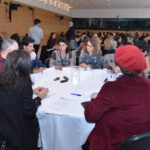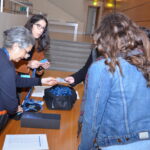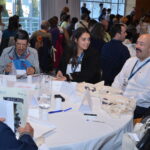The last public consultation of the CONCISE project took place on November 16 in Lisbon. 102 citizens from all over the country met in a pleasant room overlooking the Jerónimos Monastery in Belém. The chosen venue was the Belém Cultural Centre, an impressive building of the late 1980s that houses a contemporary art museum, auditoriums, restaurants and shops. Belém is the most western parish of Lisbon, bordered by the river Tagus to the south and the Monsanto forest to the north. A tourist hotspot with some of the best-known views in the city and the most delicious Lisbon pastries, the world-famous custard tarts.
Participants arrived quite on time, many having slept at a hotel in the city center. They proceeded to their allotted tables, where they were met with a smile by very attentive (and skilled) moderators and observers. Water, tape recorders, paper and pens on the tables and we were all set for a fruitful discussion. Six tables started discussing climate change, the other six vaccines. In a side room, our colleagues from Valencia and Lodz watched the proceedings. Filmmakers from Danmar went around the tables, taking pictures and filming the discussions. After an hour or so, all issues covered, everybody headed to the adjacent corridor for a well-earned break.
After the break, two new topics for discussion: alternative medicines and GMOs. Following a strict timetable, at 1pm they had lunch in a nearby room, with impressive views to the river. Participants and organisers socialised over a nice dish of chicken with rice and mushrooms (or the vegan alternative), preceded by soup and followed by dessert. After lunch, participants changed tables, meeting new moderators, observers, and fellow discussants.
Work during the afternoon was also intense. Two rounds of discussion, separated by a short break. In the end, everyone received a goody bag with some merchandising from CONCISE and the University of Lisbon Museum. Some more refreshments and participants left to enjoy the rest of the day or the weekend in Lisbon. Citizens were very pleased, enjoyed the discussion and felt they had learned a lot from each other. As proof, we have the questionnaires and all the congratulatory emails we received.
Public consultations are quite challenging. We have to ensure the recruitment and selection of a wide range of participants and that they come on the set day. We also have to guarantee that all goes according to plan and that we collect relevant research data. As well as warranting the satisfaction of citizens and that they feel that their contribution is worthy and useful. Still, all this does contribute to engage citizens and help bring them closer to science.
Ana Delicado, Jussara Rowland, João Estevens, Roberto Falanga, Mónica Truninger






